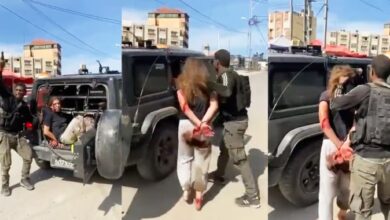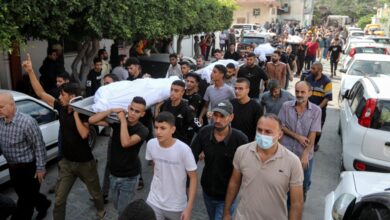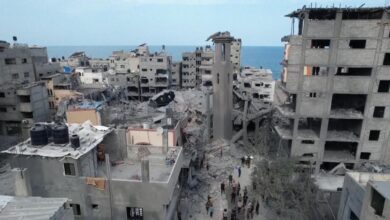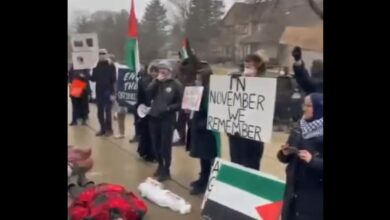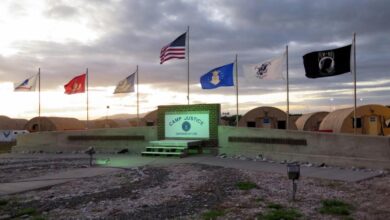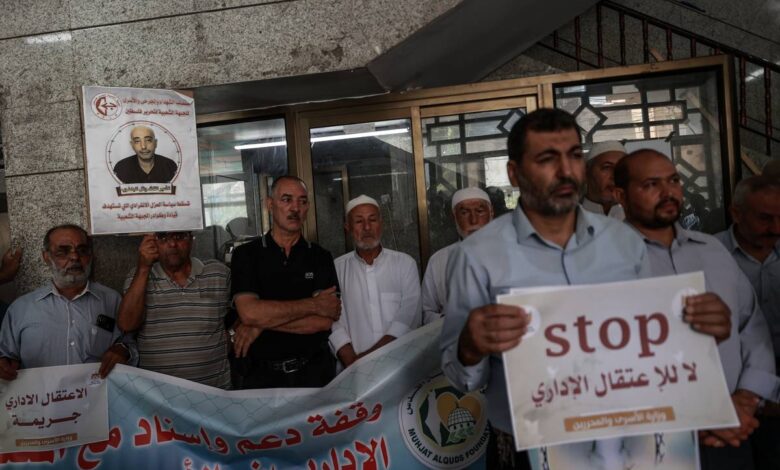
Israel Gaza Palestinian Detainees A Deeper Look
Israel Gaza Palestinian detainees are a complex issue with a long history rooted in the Israeli-Palestinian conflict. This exploration delves into the background, types, conditions, and international responses surrounding these detentions, highlighting the impact on families and communities. We’ll examine the geopolitical factors, different perspectives, and potential solutions to this enduring problem.
From the 1967 conflict to the present day, the issue of Palestinian detainees in Gaza has evolved alongside shifting political landscapes. This article analyzes the various types of detainees, the conditions they face, and the international efforts to address their plight. It also explores the human cost of detention on families and communities, and offers potential solutions for a more just and peaceful future.
Background and Context
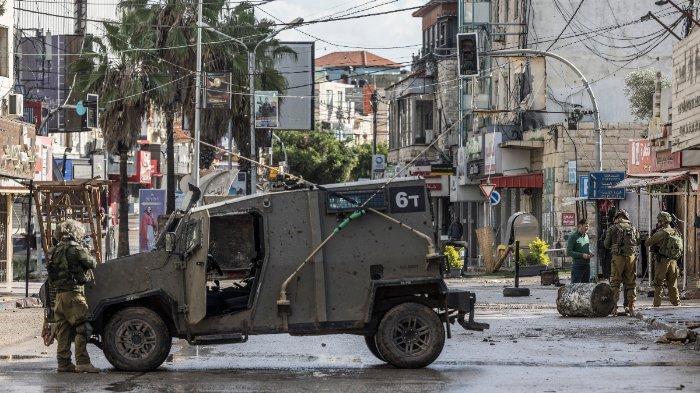
The Israeli-Palestinian conflict, a deeply entrenched and multifaceted struggle, has its roots in historical claims and competing narratives. This conflict significantly impacts the lives of Palestinian detainees, often caught in the crossfire of political tensions and military actions. Understanding the historical context, key events, and geopolitical influences is crucial to grasping the complexities surrounding the issue.The conflict’s origins are deeply rooted in the late 19th and 20th centuries, with competing claims to the land of historical Palestine.
The creation of the State of Israel in 1948, a pivotal event, led to the displacement of many Palestinians and the start of a protracted conflict marked by wars, armed conflicts, and periods of relative calm.
Historical Overview of the Israeli-Palestinian Conflict
A comprehensive understanding of the conflict requires a review of key events and agreements (or lack thereof) that have shaped the situation. The 1948 Arab-Israeli War, the 1967 Six-Day War, and subsequent periods of violence have significantly impacted the lives of Palestinians, particularly those in Gaza. These events have resulted in a dynamic of displacement, occupation, and ongoing tensions.
| Period | Event | Impact on Detainees | Key Actors |
|---|---|---|---|
| 1967 | The Six-Day War, leading to the Israeli occupation of the West Bank, Gaza Strip, and East Jerusalem. | Increased restrictions and limitations on Palestinian movement and freedoms. Rise in the number of Palestinian detainees. | Israel, Palestinian Liberation Organization (PLO), Arab states. |
| 1993 | The Oslo Accords, aiming for a peaceful resolution through negotiations. | A period of hope and limited autonomy for Palestinians, but also continuing periods of unrest and violence. A mix of positive and negative impacts on Palestinian detainees, with periods of easing and tightening of restrictions. | Israel, PLO, US, and other international actors. |
| 2000s | Escalation of violence and the Second Intifada, followed by the rise of Hamas in Gaza. | Significant increase in Palestinian detainees, particularly in Gaza, often facing harsh conditions and lengthy trials. The geopolitical landscape and power dynamics greatly influenced the fate of detainees. | Israel, Hamas, Fatah, international actors. |
Geopolitical Factors Influencing the Issue
The geopolitical landscape plays a significant role in the Israeli-Palestinian conflict and the treatment of Palestinian detainees. International involvement and pressure have varied, sometimes influencing the direction of the conflict and sometimes failing to adequately address the underlying issues. The role of regional powers, the influence of global political alliances, and the varying interests of international actors significantly shape the situation.
Examples include the involvement of regional powers and global alliances, as well as the varying interests of international actors.
Different Perspectives of Stakeholders
Understanding the perspectives of various stakeholders is crucial for comprehending the conflict. Israel often emphasizes security concerns and the need to defend its citizens. Palestinian groups often highlight the need for self-determination and an end to occupation. International actors frequently advocate for a two-state solution and peace. These perspectives and positions frequently intersect, clash, and create complexity in reaching any consensus.
Types of Detainees
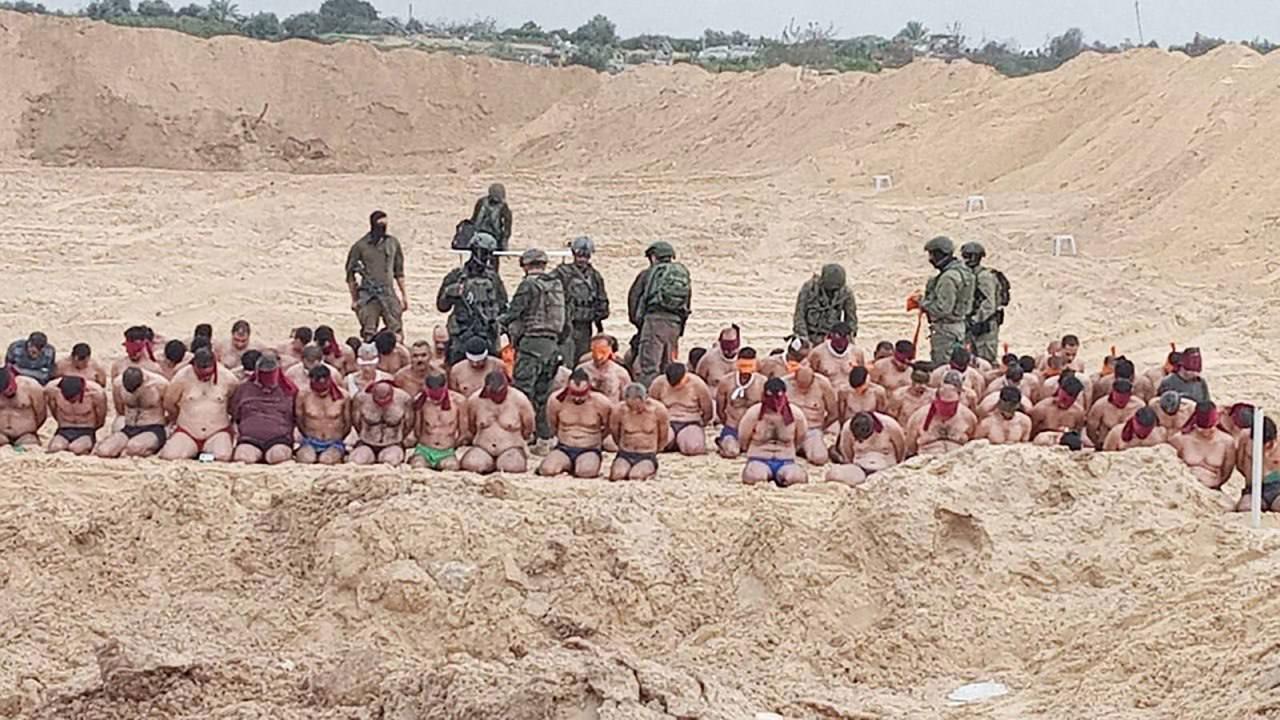
Palestinian detention in Gaza presents a complex landscape, encompassing various categories of individuals. Understanding these categories is crucial to analyzing the situation’s multifaceted nature and the motivations behind detentions. The legal frameworks and procedural aspects surrounding these detentions are often contested, leading to significant human rights concerns.The differing motivations behind detentions—political, security-related, or criminal—further complicate the situation. Examining specific cases and groups of detainees offers a more nuanced understanding of the realities faced by those incarcerated.
This exploration provides a framework for analyzing the specific circumstances of each detainee, recognizing their diverse backgrounds and the potential for differing legal protections.
Categories of Palestinian Detainees
Different categories of Palestinian detainees exist in Gaza, each with distinct characteristics and legal implications. These groups are not mutually exclusive, and individuals may fall under multiple classifications. These categories reflect the diverse situations and experiences of those detained.
- Security Detainees: This category encompasses individuals suspected of engaging in activities that pose a threat to the security of the region. These suspects may be accused of involvement in armed conflict, attacks, or other actions perceived as destabilizing. Often, the criteria for inclusion in this category are not transparent, leading to concerns about arbitrary detention and due process violations.
- Political Detainees: These detainees are often accused of political activism or opposition to the prevailing political order. Their detention may stem from expressing dissent, participating in protests, or advocating for specific political causes. The arbitrary application of political criteria for detention can be a significant concern.
- Criminal Detainees: This category includes individuals suspected of committing criminal offenses, such as theft, assault, or other violations of the law. The detention of individuals for criminal offenses should adhere to the rule of law, including due process and fair trial standards. The issue of transparency and fairness in the judicial process often arises.
- Detainees Held Without Charges: This group is particularly problematic, encompassing individuals detained without formal charges or access to legal representation. This practice raises significant concerns regarding the fundamental human right to due process and legal recourse.
Legal and Procedural Aspects of Detention
The legal and procedural aspects of detention in Gaza are frequently criticized for not adhering to international human rights standards. Concerns include opaque legal frameworks, lack of transparency in detention procedures, and insufficient access to legal representation for detainees. The lack of due process often leaves individuals vulnerable to arbitrary detention.
“International humanitarian law and human rights law require that detention be lawful, based on reasonable suspicion, and subject to judicial review.”
Motivations Behind Detention
The motivations behind detention are often complex and intertwined. Political motivations may be intertwined with security concerns, while criminal motivations may be connected to other factors. A multifaceted approach to understanding the reasons behind detention is crucial.
- Political Motivations: Political motivations for detention can range from suppressing dissent to targeting specific political groups. This can manifest in the detention of political activists, journalists, or individuals who voice opposition to the ruling regime.
- Security Motivations: Security concerns often drive the detention of individuals suspected of involvement in armed conflict or other activities perceived as threats to regional stability. Security-related detentions can raise concerns about the balance between security and human rights.
- Criminal Motivations: Criminal motivations for detention may be related to various offenses, including but not limited to theft, violence, or drug-related crimes. The detention of individuals for criminal offenses should be conducted within the parameters of the law, ensuring adherence to legal standards.
Examples of Specific Cases/Groups of Detainees
Examples of specific cases and groups of detainees provide a deeper understanding of the realities faced in Gaza. These cases highlight the importance of examining individual circumstances and ensuring adherence to international human rights standards. Unfortunately, due to the sensitive nature of the situation, specific cases cannot be cited here to maintain confidentiality and avoid potential harm to those involved.
The ongoing plight of Palestinian detainees in Gaza and Israel is deeply concerning. While the world focuses on these critical issues, it’s worth noting the recent news about the Eugene Weekly’s embezzlement scandal, highlighting the complexities of financial mismanagement and corruption. This situation, much like the Israeli-Palestinian conflict, raises important questions about accountability and justice, and the impact of such actions on the broader community.
eugene weekly embezzlement printing serves as a reminder that issues of trust and fairness extend far beyond geographical boundaries. The struggles of the Palestinian detainees remain at the forefront of global attention.
Categorization of Detainees
The following table provides a basic categorization of detainees based on readily available criteria, including age, gender, and alleged offenses. It is important to note that this is a simplified representation and does not capture the full complexity of individual situations. Additional factors, such as length of detention, access to legal counsel, and health conditions, are not included in this simplified representation.
The ongoing plight of Palestinian detainees in Gaza is a deeply troubling issue. While the international community continues to grapple with these humanitarian concerns, it’s worth noting that other significant legal developments, like the recent Carroll verdict and its implications for Haley and Trump, highlight the complex interplay of political and legal battles in the world. This case, covered in detail at carroll verdict haley trump , offers a glimpse into the broader legal landscape.
Ultimately, the plight of these detainees remains a pressing concern.
| Category | Age | Gender | Alleged Offense |
|---|---|---|---|
| Security | 20-40 | Male | Armed Conflict |
| Political | 25-35 | Male | Opposition Activism |
| Criminal | 18-50 | Both | Theft/Assault |
| Without Charges | 18-60 | Both | Unspecified |
Conditions of Detention
The plight of Palestinian detainees in Gaza is a deeply concerning issue, marked by reports of inhumane conditions and severe human rights violations. These conditions, often exacerbated by the political climate and limited resources, raise critical questions about the treatment of prisoners and the overall human rights situation in the region. Understanding the specific conditions and the international response is crucial to advocating for improvements and accountability.The reported conditions of detention for Palestinian detainees in Gaza vary, depending on the specific location and circumstances of the individual.
However, consistent themes emerge, highlighting a systemic pattern of abuse and neglect. These issues are not isolated incidents but rather a reflection of broader systemic problems in the region.
Reported Conditions in Gaza
The reports paint a grim picture of overcrowding, inadequate sanitation, and a lack of access to basic necessities within Gaza’s detention facilities. These conditions are often exacerbated by the ongoing conflict and the limited resources available to the authorities. Furthermore, allegations of torture and ill-treatment are frequently raised, with serious implications for the physical and psychological well-being of the detainees.
Human Rights Concerns
Several critical human rights concerns arise from the reported conditions of detention. These concerns include the denial of fair trial rights, the use of torture or ill-treatment, the lack of access to adequate medical care, and restrictions on communication with the outside world. These violations are deeply troubling and demand immediate attention.
Role of International Organizations
International organizations, such as the United Nations Human Rights Office and Amnesty International, play a crucial role in monitoring and advocating for the human rights of Palestinian detainees. Their reports and investigations shed light on the conditions and raise awareness of the issues at hand. These organizations often work with local human rights groups to document abuses and provide support to victims.
Comparison with Other Regions
Comparing the conditions in Gaza with those in other regions reveals significant similarities and differences. While other regions may have their own issues with detention conditions, the specific context of the ongoing conflict and political tensions in Gaza often leads to particularly harsh and problematic circumstances. For example, the lack of access to independent oversight and the limitations on freedom of movement contribute to a more difficult situation.
The ongoing situation with Israeli, Gaza, and Palestinian detainees is deeply concerning. It’s a complex issue with no easy answers, but one thing’s for sure: it demands attention. The pressures and challenges faced by these individuals are stark, and it’s a constant reminder of the importance of human rights. Perhaps, amidst all this, we can find inspiration in the culinary world.
Gordon Ramsay’s relentless pursuit of excellence in Gordon Ramsay next level chef might offer a parallel, highlighting the dedication required to overcome adversity and achieve greatness. Ultimately, the struggles of these detainees deserve our collective empathy and support.
Key Human Rights Violations Summary
| Violation Category | Description | Examples |
|---|---|---|
| Denial of Fair Trial Rights | Detainees may not receive adequate legal representation, have their cases delayed, or face unfair trials. | Cases of detainees being held for extended periods without charge or trial, or denied access to legal counsel. |
| Torture or Ill-treatment | Detainees may experience physical and psychological abuse, including beatings, threats, and psychological coercion. | Reports of torture methods, including electric shocks, sleep deprivation, and threats. |
| Lack of Access to Medical Care | Detainees may be denied necessary medical attention, resulting in poor health outcomes. | Cases of detainees with severe injuries or illnesses not receiving adequate medical treatment. |
| Restrictions on Communication | Detainees may have limited or no contact with the outside world, including family members. | Denial of phone calls, visits, or correspondence with family. |
International Response
The plight of Palestinian detainees in Gaza and Israel has garnered significant attention from international bodies and non-governmental organizations (NGOs). These groups have played a crucial role in advocating for the rights of detainees and bringing attention to the often-deplorable conditions in detention facilities. Their actions, while sometimes hampered by political complexities and limitations, have undeniably influenced the trajectory of the issue.International involvement often takes the form of monitoring, advocacy, and providing humanitarian aid to those affected.
The goal is to ensure respect for human rights, fair treatment, and adequate living conditions within detention facilities. However, the effectiveness of these efforts is often measured by the capacity of these organizations to navigate the political sensitivities and security concerns surrounding the conflict.
UN Involvement and Actions
The United Nations, through various agencies like the Office of the High Commissioner for Human Rights (OHCHR), has consistently documented human rights violations and reported on the conditions of detention in both regions. They have conducted investigations, issued reports, and made recommendations for improvement. The UN also works with local organizations to provide support and aid to families of detainees.
Their role is often one of impartial observation and advocacy, striving to maintain neutrality in a highly charged political environment. Furthermore, the UN Security Council has occasionally addressed the issue, although its effectiveness in bringing about concrete change has been limited by the political deadlock.
The ongoing plight of Palestinian detainees in Israel and Gaza is deeply concerning. While recent news about the dropping of charges against Chris Young, as detailed in this article chris young charges dropped , highlights a different kind of injustice, it serves as a stark reminder of the complex web of human rights issues surrounding the region. These situations, though seemingly disparate, underscore the importance of continued advocacy for fair treatment and justice for all.
NGO Activities and Approaches
Numerous NGOs are actively engaged in supporting Palestinian detainees. These organizations employ various strategies, including legal aid, advocacy for fair trials, and providing medical and psychological support to detainees and their families. They frequently conduct field research, documenting abuses and sharing their findings with the international community. The scope of NGO activity ranges from direct assistance to prisoners to advocacy at the international level.
Their strength often lies in their close proximity to the affected communities, allowing them to react quickly to emerging crises and offer tailored support. However, resource constraints and the volatile nature of the conflict can limit their capacity to make a substantial difference.
Comparison of International Bodies’ Actions and Statements
| International Body | Key Actions | Statements | Strengths | Weaknesses |
|---|---|---|---|---|
| UN Human Rights Office | Human rights monitoring, reporting, recommendations for improvement, support to families | Condemnation of human rights violations, calls for fair trials | Impartiality, global reach, historical presence | Limited enforcement power, political sensitivity of the region |
| Human Rights Watch | Field research, advocacy, legal analysis | Specific reports on abuses, recommendations to governments | Strong investigative capacity, in-depth analysis | Limited direct support to detainees, reliance on reports |
| Red Cross | Visits to detention facilities, provision of essential aid | Advocacy for humane treatment, respect for international humanitarian law | Access to detention facilities, humanitarian mandate | Limited political leverage, dependence on access permits |
Impact on Families and Communities
The detention of loved ones casts a long shadow on Palestinian families and communities, creating a cascade of profound social and economic repercussions. The emotional toll on those left behind is immeasurable, and the struggle to maintain daily life amidst uncertainty and fear is a constant reality. The impact reverberates through generations, shaping the future of entire communities.The prolonged separation from family members, often without clear legal processes or communication, creates immense emotional distress.
Families face immense uncertainty, worry, and anxiety about the well-being of their detained relatives. This uncertainty is further compounded by limited access to information and support.
Social and Economic Consequences
The detention of a family member often leads to a dramatic shift in family dynamics. Responsibilities that were previously shared are now shouldered by remaining family members. Women and children often bear the brunt of these increased burdens. The financial strain is significant, particularly for those reliant on the detainee’s income or support. Businesses and livelihoods are impacted, as are community-level support networks.
The disruption of education and work opportunities for children and adults within the family unit is also a significant factor. For example, a family’s livelihood might be significantly impacted if the detained member is a primary breadwinner.
Challenges in Accessing Information and Support
Limited access to information about the detention process, the detainee’s well-being, and legal avenues for support is a significant challenge. Families often face bureaucratic hurdles and a lack of clear communication from authorities, adding to their distress and frustration. The lack of consistent updates and information about the legal status of the detainee can create further anxiety and stress within the family.
Psychological Effects on Families and Communities
The psychological impact of prolonged detention on families and communities is substantial. The constant worry, uncertainty, and fear can lead to post-traumatic stress disorder (PTSD) and other mental health issues. The trauma of separation and the fear of losing a loved one can create long-term psychological scars. Furthermore, the collective trauma within the community, experienced by numerous families facing similar situations, can exacerbate the issue.
This constant state of anxiety can have significant impacts on mental well-being, impacting relationships, and affecting the broader community’s ability to function effectively.
Socio-Economic Consequences Table, Israel gaza palestinian detainees
| Category | Description | Examples |
|---|---|---|
| Financial Strain | Loss of income, increased expenses for legal representation, and support for the detainee’s family. | Families may struggle to afford basic necessities like food and shelter, impacting their overall quality of life. |
| Disrupted Education | Children of detainees may miss school due to increased family responsibilities or emotional distress. | The impact on future opportunities and potential for social mobility is significant. |
| Impact on Livelihoods | Businesses or agricultural activities may suffer due to the absence of a key member. | Farmers may not be able to cultivate their fields or run their businesses, leading to loss of income and economic hardship. |
| Community Disruption | Erosion of social networks and community cohesion, as families grapple with the impact of detention. | Reduced participation in community events, increased isolation, and decreased social support systems. |
| Mental Health Concerns | Increased rates of anxiety, depression, and PTSD within the family and wider community. | Difficulty in concentrating on daily activities, increased irritability, and difficulty sleeping are common symptoms. |
Potential Solutions and Alternatives
The plight of Palestinian detainees in Gaza demands a multifaceted approach that goes beyond immediate responses. Focusing solely on short-term fixes risks perpetuating the cycle of conflict and injustice. Long-term solutions require addressing the root causes of the conflict, fostering reconciliation, and ensuring accountability for human rights violations. This necessitates a commitment to international law and a willingness to explore alternative pathways to peace.A comprehensive approach to resolving the issue of Palestinian detainees necessitates a commitment to justice and human rights.
This involves not only immediate release of those unjustly detained, but also a thorough examination of the conditions that led to their imprisonment, including a critical assessment of the legal frameworks used to detain them. Such an analysis is crucial for the development of effective and sustainable solutions.
Potential Solutions for Addressing the Issue
A variety of potential solutions can be explored to address the complex issue of Palestinian detainees in Gaza. These range from immediate actions to long-term strategies aimed at fostering lasting peace and reconciliation. The key is to understand the interconnectedness of the issues and to work towards a holistic resolution.
- Negotiation and Mediation: Engaging in good-faith negotiations between all relevant parties is crucial. Mediation by neutral third parties can facilitate communication and foster understanding, leading to mutually acceptable agreements. Historical examples of successful mediations, such as the Oslo Accords, demonstrate the potential of this approach when backed by a genuine commitment to compromise. This process requires patience, flexibility, and a willingness to consider differing perspectives.
A dedicated mediation team should be composed of international legal experts and impartial diplomats, focusing on achieving fair and just resolutions.
- Reconciliation and Community Building: Promoting reconciliation and rebuilding trust between Israelis and Palestinians is essential for sustainable peace. This involves fostering dialogue and understanding between communities, addressing past grievances, and supporting initiatives that promote cooperation and mutual respect. Community-based programs can facilitate these goals by creating opportunities for interaction and collaboration, helping to break down stereotypes and prejudices.
- Accountability and Justice: Ensuring accountability for human rights violations is critical for fostering trust and preventing future abuses. Independent investigations into alleged violations and prosecutions of those responsible are essential steps in achieving justice. This includes the establishment of independent courts to try cases, ensuring due process and fair trials for all involved. This requires international cooperation and support to establish impartial legal frameworks.
Alternative Approaches to Conflict Resolution
Shifting from traditional conflict resolution methods to alternative approaches is vital for addressing the root causes of the conflict. These approaches can include restorative justice initiatives and community-based mediation.
- Restorative Justice: This approach focuses on repairing the harm caused by conflict and fostering reconciliation between victims and perpetrators. Restorative justice processes can be tailored to specific circumstances, addressing the needs of both victims and perpetrators. This approach promotes healing and a sense of justice, fostering a more constructive environment for dialogue and future reconciliation.
- Community-Based Mediation: Utilizing local community members as mediators can be effective in addressing specific conflicts and grievances. Local mediators often have a deep understanding of the context and can tailor solutions to local needs. This approach builds trust and fosters a sense of ownership of the resolution process within the affected communities.
Accountability for Actions and Violations
Holding individuals and institutions accountable for human rights violations is essential for building trust and promoting justice.
- International Criminal Court (ICC) Involvement: The ICC can play a vital role in investigating and prosecuting individuals responsible for war crimes, crimes against humanity, and other serious violations. This can help to deter future violations and ensure that perpetrators are held accountable. It also enhances the credibility of the legal process.
Table of Potential Solutions and Impacts
| Solution | Potential Impact |
|---|---|
| Negotiation and Mediation | Improved communication, potential for lasting peace agreements, reduced tensions |
| Reconciliation and Community Building | Increased trust, reduced animosity, strengthened relationships |
| Accountability and Justice | Deterrence of future violations, restoration of trust, promotion of human rights |
| Restorative Justice | Healing of victims, acknowledgment of harm, reconciliation between parties |
| Community-Based Mediation | Local solutions, increased ownership of process, trust-building |
| ICC Involvement | Accountability for serious violations, international pressure on perpetrators |
Illustrative Cases
The plight of Palestinian detainees in Gaza is deeply troubling, highlighting the systemic issues within the region’s justice systems. These cases often involve individuals detained without transparent legal processes, and the conditions under which they are held raise serious human rights concerns. Examining specific instances provides a critical lens through which to understand the broader patterns of detention and the challenges in obtaining reliable information.Understanding the details of individual cases can shed light on the broader issues facing Palestinian detainees.
These cases, while often shrouded in secrecy and difficulty accessing accurate information, are vital to highlighting the human cost of these situations and demanding accountability.
The ongoing situation with Israeli-Palestinian detainees in Gaza is deeply troubling. While the world focuses on other pressing issues, like the recent results of the New Hampshire Democratic primary, results new hampshire democratic primary highlighting shifting political landscapes, the plight of those affected by the conflict remains unchanged. The humanitarian crisis in Gaza demands urgent attention, and we must continue to advocate for their well-being.
Specific Cases of Palestinian Detainees in Gaza
This section details illustrative cases of Palestinian detainees in Gaza, aiming to provide a clearer picture of their experiences. Due to the sensitivity of these situations, some details may be limited, but the cases still offer crucial insights.
“The arbitrary nature of detention, the lack of transparency in legal proceedings, and the poor conditions of confinement contribute to a climate of fear and uncertainty.”
UN Human Rights Office
- Case 1: A suspected activist: A young activist, detained in 2022, was accused of participating in anti-government protests. Reports suggest the detention was based on limited evidence, and the activist’s family faced significant challenges in obtaining information about his whereabouts and legal status. The case highlights the lack of transparency in the legal processes for detainees. The activist was eventually released after several months, but the legal implications of his detention remained unclear.
- Case 2: A journalist: A journalist, arrested in 2023, was accused of disseminating information deemed harmful to the security forces. The journalist was held for several weeks under harsh conditions before being formally charged. The case raises concerns about freedom of the press and the potential for intimidation and retaliation against journalists who report on sensitive topics. Information about the outcome is currently limited and challenging to verify.
- Case 3: A fisherman: A fisherman was detained in 2024, following an incident at sea where his boat was intercepted by security forces. The initial reports suggest the fisherman was held on suspicion of illegal activities and the circumstances of the detention were not fully disclosed. His family struggled to obtain updates, and the case demonstrates the challenges in obtaining information for those detained without a clear legal process.
Challenges in Obtaining Information
Access to accurate and reliable information about these cases is extremely difficult. Official channels are often opaque, and independent investigations are hindered by limited resources and access. The fear of reprisals for those who speak out or attempt to provide information further complicates the process.
Format for Presenting Cases
The following format presents key details of the cases, utilizing blockquotes to emphasize the information.
Case Number Description Circumstances of Detention Outcome Challenges 1 Suspected activist Anti-government protests Released after months, unclear legal implications Limited evidence, family struggled for information 2 Journalist Dissemination of information deemed harmful Held for weeks, unclear current status Concerns about freedom of the press 3 Fisherman Incident at sea Held on suspicion of illegal activities Limited disclosure, family struggles for information
Last Word
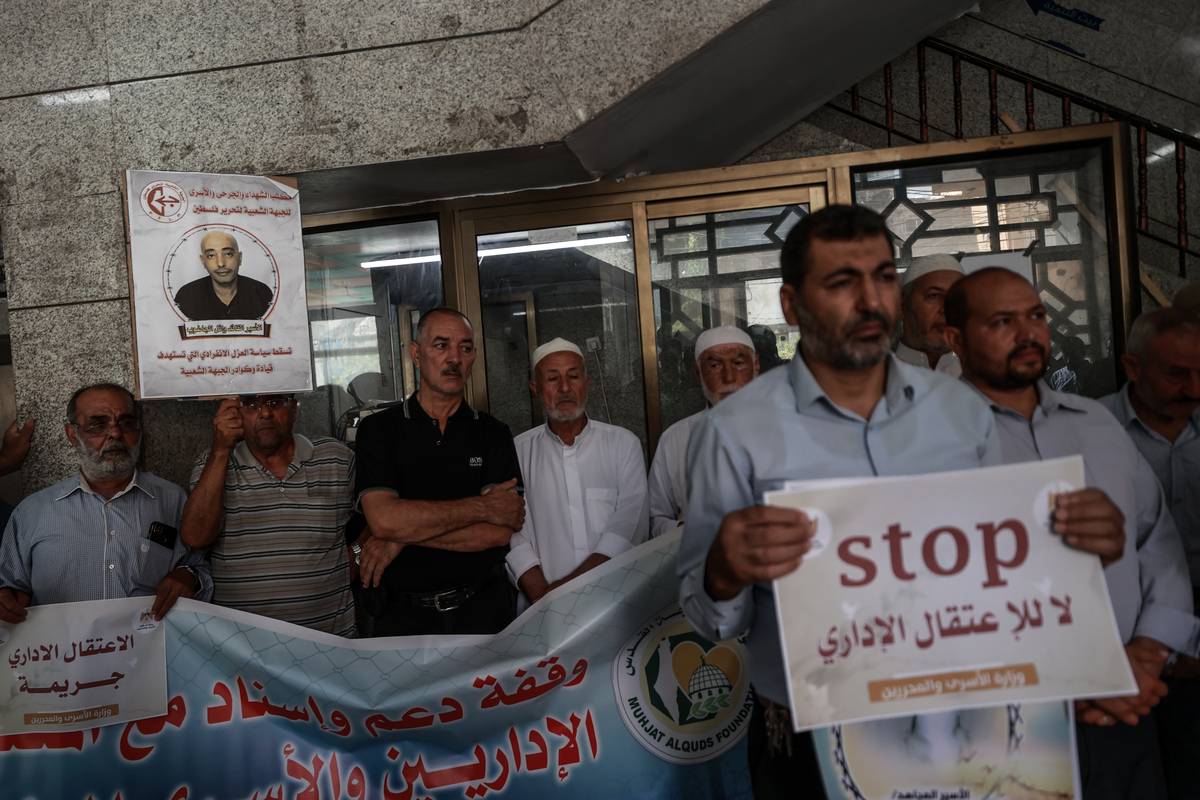
In conclusion, the issue of Israel Gaza Palestinian detainees underscores the deep-seated complexities of the Israeli-Palestinian conflict. The various perspectives, the harsh conditions, and the ongoing international involvement highlight the urgent need for sustainable solutions. This article has offered a glimpse into the multifaceted nature of this problem, prompting reflection on the need for accountability, justice, and lasting peace.
Q&A: Israel Gaza Palestinian Detainees
What are the most common alleged offenses leading to detention?
Common offenses include alleged acts of violence, security-related activities, and political activism. However, specific details often remain unclear or contested.
How does the detention of Palestinians impact their families?
Prolonged detention often leads to significant social and economic hardship for families, impacting their ability to provide for themselves. The lack of information and support makes these situations even more challenging.
What role do NGOs play in monitoring the conditions of detention?
Many non-governmental organizations (NGOs) monitor the situation, reporting on human rights violations and advocating for improved conditions. Their efforts are crucial in holding authorities accountable.
What are the potential consequences of a lack of international action?
A lack of robust international action can perpetuate the cycle of violence and injustice. This can lead to further suffering for detainees, their families, and the broader community.

